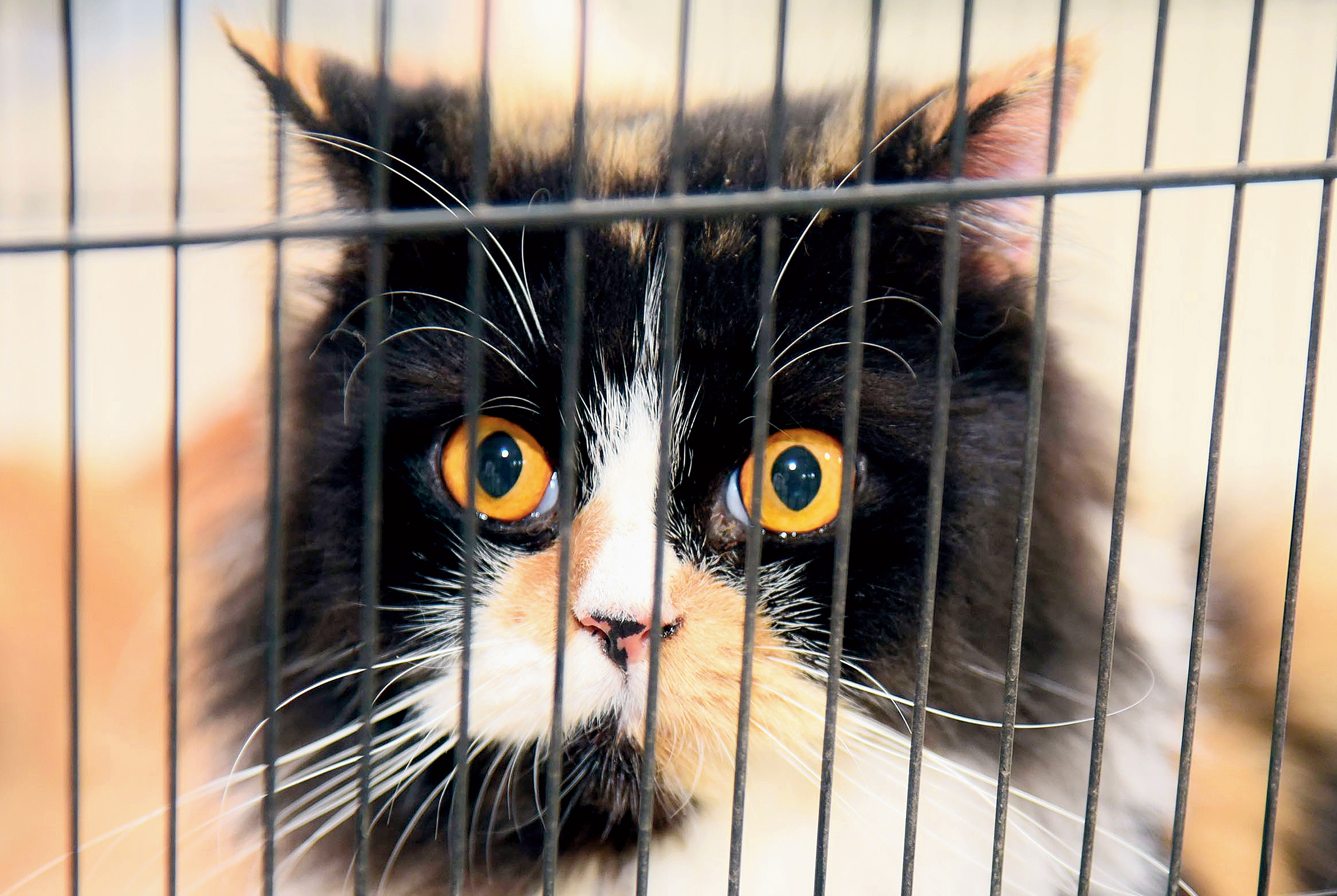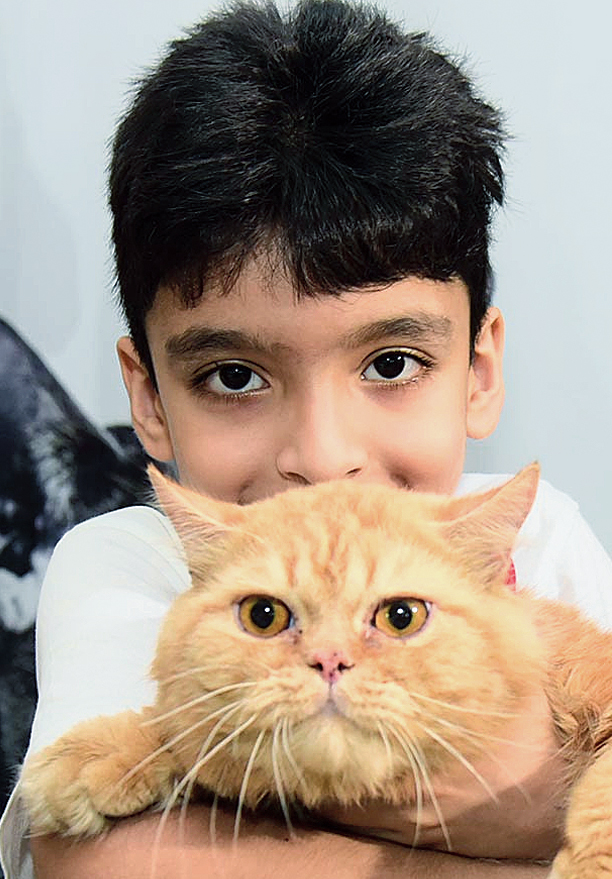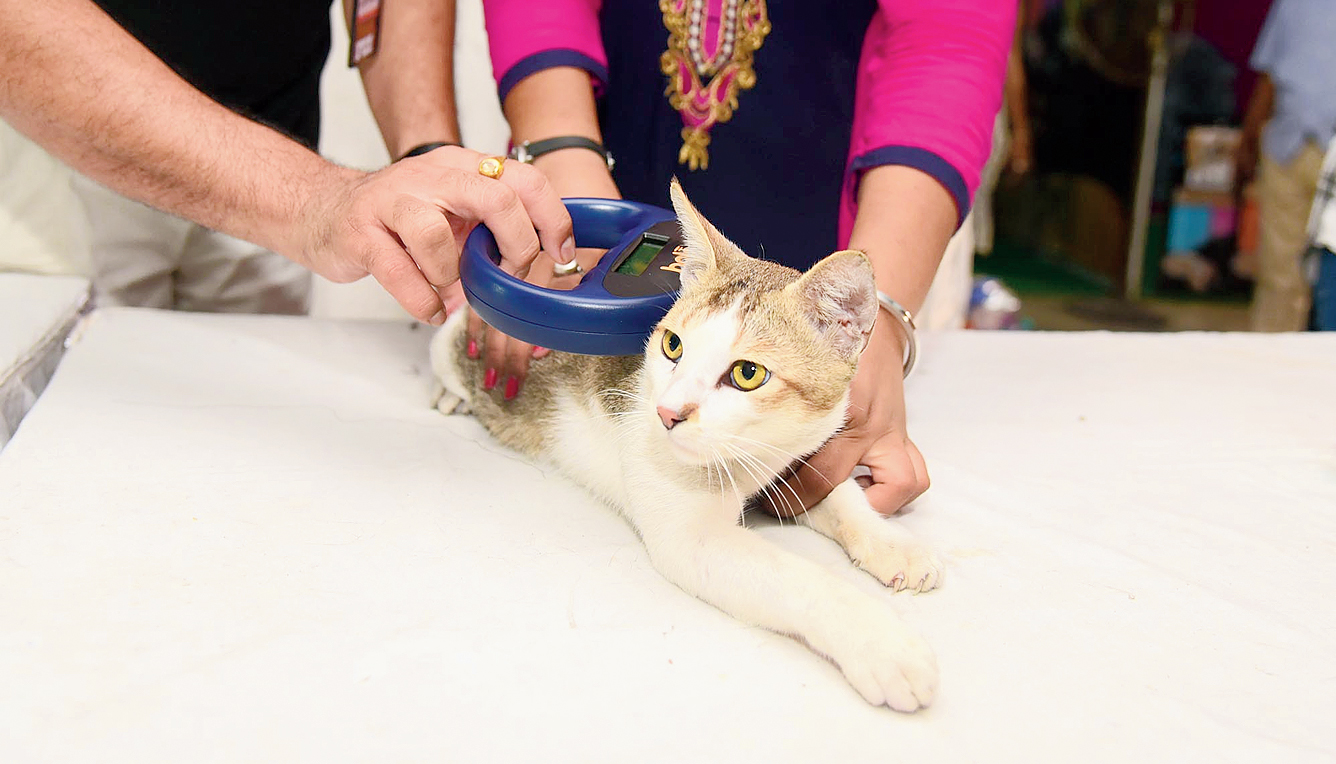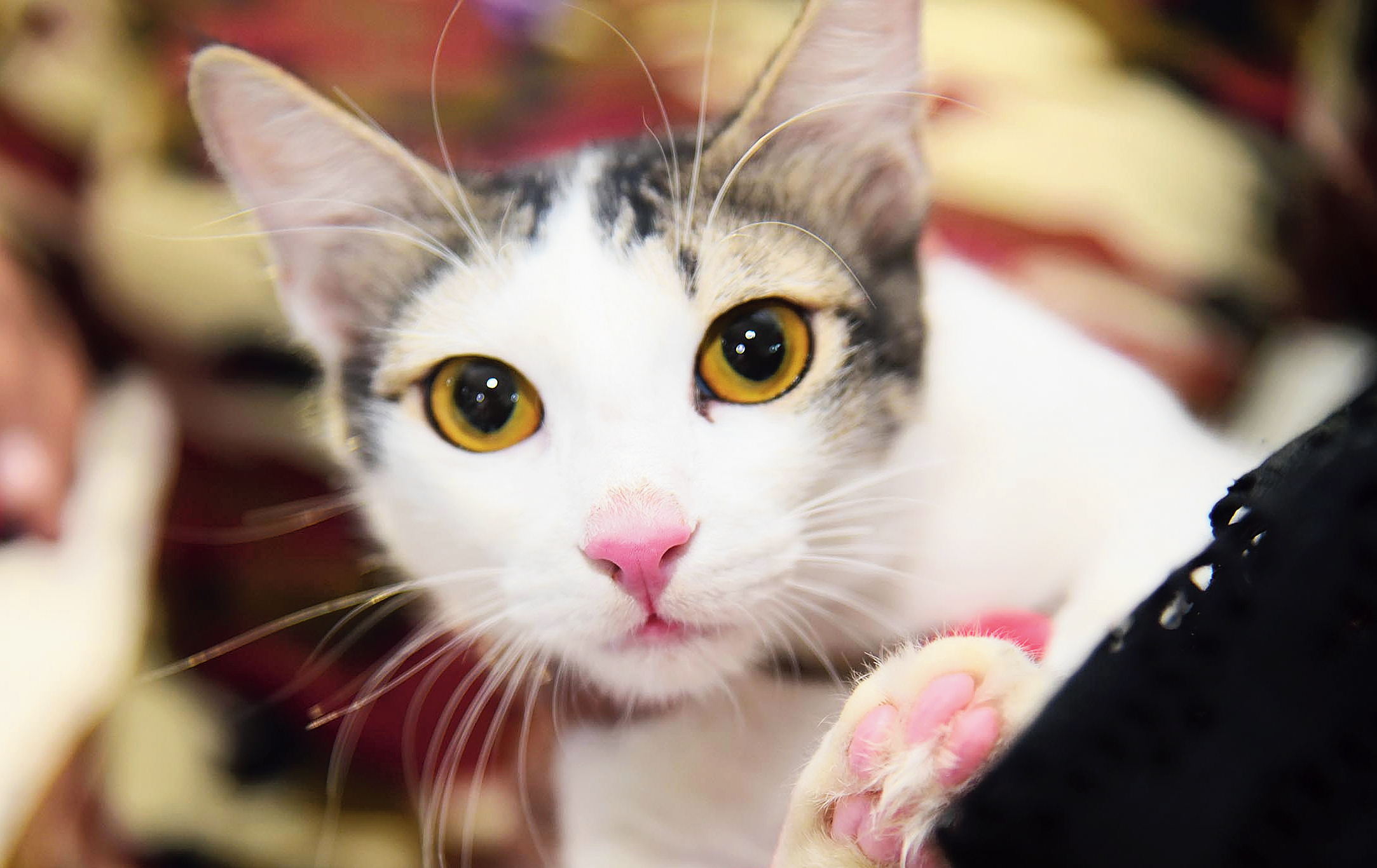
A day after World Veterinary Day this year, The Feline Club of India held an event where vets from around the country spoke on how to care for cats. Held on April 28 at an SN Banerjee Road venue, the convention also performed cat registration by way of microchipping.
“We have been holding cat registration drives across the country over the last three years but this was our first in eastern India,” said Souradip Rupam Das, a cat and dog breeder who is in charge of the club’s city operations. “We would have been happy with 150 cats today but we got 253!”
Seventeen cats were of foreign origin such as Persian, Classic Longhair and British Longhair but the rest were Indian cats, that the club has respectfully named “Indimau”. “Of all the cities Calcutta has registered the highest number of Indimaus and we are thrilled! Those who keep foreign breeds usually expect some return by way of selling the kittens later but those who keep Indimaus do it out of pure love,” said Das. Here’s what we learnt at the event —
Pain management

By Mumbai-based vet Deepa Katyal, who is also on the board of directors of the International Veterinary Academy of Pain Management
When you visit a homeopathy doctor with a headache, do you know what he will ask you? He’ll ask you if it’s a throbbing pain or stinging pain, how long and often it pains…. What about your cat? Let alone, throbbing or stinging, the cat has no way to even communicate it has a headache!
The problem is all the more severe as cats have the habit of suffering in silence without making a show of their pain.
But cat owners are a key source of information in assessing pain. Here is what they how they can help —
- Behaviour- Is your cat behaving abnormally? Cats usually like grooming themselves, so it would be strange if she suddenly stops. Is your white cat looking black with dirt? Has she stopped using the “litter box” to relieve herself? Has your friendly cat suddenly become aggressive? Is she not chewing her food? Is she reacting if you touch a part of her body?
- Posture- Sleep is a sign of rest and comfort but is she sleeping in an awkward, unnatural posture? Is she constantly moving from place to place and not finding peace in any position? Is she pressing her head against the wall, taking position to urinate but there is no urine being passed?
- Facial expressions- Take note if her brow is furrowed, if she is squinting her eyes or hanging her head down
- Record videos of the cat when she is acting abnormally and show your vet. Besides medicines, the vet can use thermotherapy, cold laser, massages, acupuncture, hydrotherapy etc to relieve the pain.
Diet
Varun Sharma spokesperson, Champion Petfoods, Hyderabad
The domestic cat shares over 90 per cent of its genes with the African wild cat. The take-home message is that we need to mimic nature and with aspects like diet, provide our pet cats a diet as similar as possible to the wild cats.
Unlike dogs, cats are carnivores. They cannot live a vegetarian life. And it’s not enough to give them fish for every meal. Wild cats hunt and eat different meats and your pet cat needs the same routine. So give her fish, chicken, duck….
If you feed your cat meat from the market, ensure it’s hormone and antibiotic-free.
Carbohydrates are not mandatory for cats and you could eliminate rice from the cat’s diet and replace with oats and quinoas. Don’t give milk as cats are lactose intolerant.
Shyam Sundar Karar, spokesperson, Virbac Animal Health India
Majority of infectious diseases can be avoided by simple practices-
- Use cat-safe sanitiser (with less chemicals) to mop the floor. Use the same to clean the cat litter box at least twice a day.
- Change drinking water in her bowl once or twice a day
- Long-haired cats are prone to hair-matting, that can be a breeding ground for fungi. Brush daily
- Minimise your cat’s interaction with stray animals to reduce risk of infections. If she does go out, bathe every 20-25 days
Parasites are external or internal organisms that rob your pet off nutrition and harm her health. Fleas and ticks are examples of external parasites and tapeworms and roundworms are internal parasites.
To keep your pet safe, deworm as per the vets’ instructions. Deworm a week before vaccination too.
How to detect worms-
- Your cat may appear pot-bellied
- She may suffer weight loss
- There may be white segments in her faeces
- Vomiting, diarrhoea
- The cat may frequently rub her bottom on the ground
Neutering of cats

A boy holds his Classic Longhair cat

By Calcutta-based vet Subhas Sarkar
Cat owners often have doubts about neutering but it can be good for the cat. Female cats can get pregnant thrice a year and deliver a litter of three to four every time. So left to her own, the cat would deliver nine to 12 kittens a year. Can you nurture so many? Cats attain puberty at six to eight months and so must be neutered before that. Males lose their aggression if neutered timely and females would not go in heat. The surgery takes about 45 minutes to perform. Rates are about Rs 5,000 (female), and Rs 3,500 (male).
The Bengal cat


By Saquib Pathan, FCI president
One of the most sought-after cat breeds today is the Bengal Cat but it has nothing to do with West Bengal.
In 1963 American cat breeder Jean Mill crossed an Asian Leopard Cat (a small but wild cat) with a domestic cat. She wanted a pet with the features of a leopard and temperament of a domestic cat. The Bengal cat was perfected after 30 or 40 generations and the name originates from the scientific name of the Asian Leopard Cat — prionailurus ‘bengal’ensis.
The Bengal Cat is sleek, its coat silky and nature dependable. (Das, of FCI, has a Bengal Cat in Calcutta. They cost about Rs 3 lakh.)
Microchipping in cats

By city-based vet Krishanu Ghosh
Microchipping is a method of inserting a permanent ID into your cat. The chip is the size of a rice grain and is injected between the shoulder blades using a syringe.
A registered cat’s chip would store an ID number, his name, age, breed, owner’s details, ancestory etc. The chips use radio frequency identification and will display the information when we place a barcode reader-like device on the cat’s skin.
Microchipping is easy and its benefits are several. If a rescued cat is brought to me I can scan it for the owner’s contact. Many countries have made microchipping mandatory when transporting animals. But it is not a tracking device like GPS. The chip costs Rs 800 to 1,000 and lasts lifelong.

A microchip reader placed on a cat displays his details.

A syringe that injected the microchip.
Dental care in cats

By Calcutta-based vet Aparajita Chakraborty
By the age of four many cats develop dental problems but they suffer in silence. Here is what pet owners can look out for —
Symptoms of dental disease-
- Tooth loss, loose or broken tooth
- Mouth sores and ulcers
- Bad breath, gingivitis (gum disease)
- Pawing at the mouth, scratching the cheek, drooling
- Difficulty in eating, loss of appetite
- Maintain good dental health-
- Ensure good nutrition
- Start brushing your cat’s teeth with a small toothbrush from the time she is a kitten. Else it will be difficult to start at an older age. Also, use cat tooth paste. Human toothpaste will give them diarrhoea.
- Take her for routine check-ups every four to six months
UTI care in cats
Cats are prone to urinary tract infection so stay alert —
Symptoms-
- Painful urination. The cat may even cry out loud while urinating. There may be difficulty urinating, frequent urination or blood in urine. Urine odour would be stronger than usual
- The cat may be licking her genitals
- Abdomen would be swollen
Nature and nutrition

Pictures by Shubham Paul
Mumbai-based vet Dhananjay Pandit
A cat is not a small dog. It is a completely different ball game to own a cat. In fact, it is said that you don’t own a cat; the cat owns you!
The ethogram of a cat if different from that of a dog. Cats need to explore, hunt, groom, mark, observe, sleep, eat and play. Cats that live completely indoors can suffer from stress if they cannot perform these activities.
The cat’s diet must include six nutrients — fats, carbohydrates, proteins, minerals, vitamins and water. But it’s not that straightforward. Different nutrients are available from different ingredients and the amount of nutrition derived from them all are different
Eighty-five grams of chicken breast has less nutrition than 85g pork loin so which to feed and how much? The different cuts of meats have nutrition too. Consult your vet for details.
Cats have a strong sense of smell and the aroma of food is instrumental in their liking or disliking a dish. A fat cat has a fat owner and a fat owner has a fat cat. Obesity is bad for your pet so give her exercise and never over-feed her. Do not allow them spicy and oily food from your own platter.
It’s also a big job getting a cat to drink water. They tend to avoid it and this can lead to urinary stones. So how to entice them to drink? Change the water in the bowl frequently so there is no smell in the bowl. Cats can also get irritated if their whiskers touch the water while drinking. They love drinking running water from taps, if you can arrange that.










